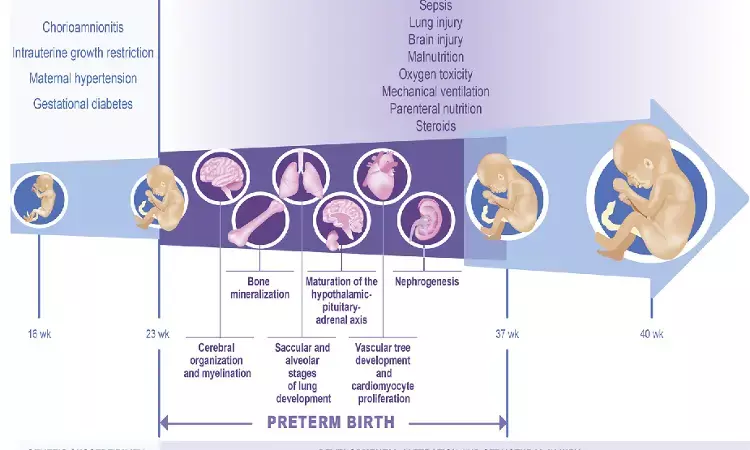- Home
- Medical news & Guidelines
- Anesthesiology
- Cardiology and CTVS
- Critical Care
- Dentistry
- Dermatology
- Diabetes and Endocrinology
- ENT
- Gastroenterology
- Medicine
- Nephrology
- Neurology
- Obstretics-Gynaecology
- Oncology
- Ophthalmology
- Orthopaedics
- Pediatrics-Neonatology
- Psychiatry
- Pulmonology
- Radiology
- Surgery
- Urology
- Laboratory Medicine
- Diet
- Nursing
- Paramedical
- Physiotherapy
- Health news
- Fact Check
- Bone Health Fact Check
- Brain Health Fact Check
- Cancer Related Fact Check
- Child Care Fact Check
- Dental and oral health fact check
- Diabetes and metabolic health fact check
- Diet and Nutrition Fact Check
- Eye and ENT Care Fact Check
- Fitness fact check
- Gut health fact check
- Heart health fact check
- Kidney health fact check
- Medical education fact check
- Men's health fact check
- Respiratory fact check
- Skin and hair care fact check
- Vaccine and Immunization fact check
- Women's health fact check
- AYUSH
- State News
- Andaman and Nicobar Islands
- Andhra Pradesh
- Arunachal Pradesh
- Assam
- Bihar
- Chandigarh
- Chattisgarh
- Dadra and Nagar Haveli
- Daman and Diu
- Delhi
- Goa
- Gujarat
- Haryana
- Himachal Pradesh
- Jammu & Kashmir
- Jharkhand
- Karnataka
- Kerala
- Ladakh
- Lakshadweep
- Madhya Pradesh
- Maharashtra
- Manipur
- Meghalaya
- Mizoram
- Nagaland
- Odisha
- Puducherry
- Punjab
- Rajasthan
- Sikkim
- Tamil Nadu
- Telangana
- Tripura
- Uttar Pradesh
- Uttrakhand
- West Bengal
- Medical Education
- Industry
IMIDs may not significantly increase risk of Preterm birth and Low birthweight, finds study

IMIDs may not significantly increase the risk of Preterm Birth and Low birthweight suggests a new study published in the eClinical Medicine.
Immune-mediated inflammatory diseases (IMIDs) are likely to complicate maternal health. However, literature on patients with IMIDs undergoing pregnancy is scarce and often overlooks the presence of comorbidities. We aimed to evaluate the impact of IMIDs on adverse pregnancy outcomes after assessing and addressing any discrepancies in the distribution of covariates associated with adverse pregnancy outcomes between patients with and without IMIDs.They conducted a retrospective cohort study using data from an integrated U.S. community healthcare system that provides care across Alaska, California, Montana, Oregon, New Mexico, Texas, and Washington. We used a database containing all structured data from electronic health records (EHRs) and analyzed the cohort of pregnant people who had live births from January 1, 2013, through December 31, 2022. We investigated 12 selected IMIDs: psoriasis, inflammatory bowel disease, rheumatoid arthritis, spondyloarthritis, multiple sclerosis, systemic lupus erythematosus, psoriatic arthritis, antiphospholipid syndrome, Sjögren's syndrome, vasculitides, sarcoidosis, and systemic sclerosis. We characterized patients with IMIDs before pregnancy (IMIDs group) based on pregnancy/maternal characteristics, comorbidities, and pre-pregnancy/prenatal immunomodulatory medications (IMMs) prescription patterns.
The 1:1 propensity score matched the IMIDs cohort with people who had no IMID diagnoses before pregnancy (non-IMIDs cohort). Outcome measures were preterm birth (PTB), low birth weight (LBW), small for gestational age (SGA), and caesarean section. Findings: The analytic cohort had 365,075 people, of which 5784 were in the IMIDs group and 359,291 were in the non-IMIDs group. The prevalence rate of pregnancy of at least 20 weeks duration in people with a previous IMID diagnosis has doubled in the past ten years. 17% of the IMIDs group had at least one prenatal IMM prescription. Depending on the type of IMM, 48%–70% of the patients taking IMMs before pregnancy continued them throughout pregnancy. Overall, patients with one or more of these 12 IMIDs had increased risk of PTB (Relative risk (RR) = 1.1 [1.0, 1.3]; p = 0.08), LBW (RR = 1.2 [1.0, 1.4]; p = 0.02), SGA (RR = 1.1 [1.0, 1.2]; p = 0.03), and caesarean section (RR = 1.1 [1.1, 1.2], p < 0.0001) compared to a matched cohort of people without IMIDs.
When adjusted for comorbidities, patients with rheumatoid arthritis (PTB RR = 1.2, p = 0.5; LBW RR = 1.1, p = 0.6) and inflammatory bowel disease (PTB RR = 1.2, p = 0.3; LBW RR = 1.0, p = 0.8) did not have significantly increased risk for PTB and LBW. For patients who have been pregnant for 20 weeks or more, the association between IMIDs and adverse pregnancy outcomes depends on both the nature of the IMID and the presence of comorbidities. Because this study was limited to pregnancies resulting in live births, results must be interpreted together with other studies on early pregnancy loss and stillbirth in patients with IMIDs.
Reference:
Maternal-fetal outcomes in patients with immune-mediated inflammatory diseases, with consideration of comorbidities: a retrospective cohort study in a large U.S. healthcare system. Yeon Mi Hwang, Qi Wei, Samantha N. Piekos, Bhargav Vemuri, Sevda Molani, Philip Mease et al. Published:February 01, 2024DOI:https://doi.org/10.1016/j.eclinm.2024.102435
Dr. Shravani Dali has completed her BDS from Pravara institute of medical sciences, loni. Following which she extensively worked in the healthcare sector for 2+ years. She has been actively involved in writing blogs in field of health and wellness. Currently she is pursuing her Masters of public health-health administration from Tata institute of social sciences. She can be contacted at editorial@medicaldialogues.in.
Dr Kamal Kant Kohli-MBBS, DTCD- a chest specialist with more than 30 years of practice and a flair for writing clinical articles, Dr Kamal Kant Kohli joined Medical Dialogues as a Chief Editor of Medical News. Besides writing articles, as an editor, he proofreads and verifies all the medical content published on Medical Dialogues including those coming from journals, studies,medical conferences,guidelines etc. Email: drkohli@medicaldialogues.in. Contact no. 011-43720751


